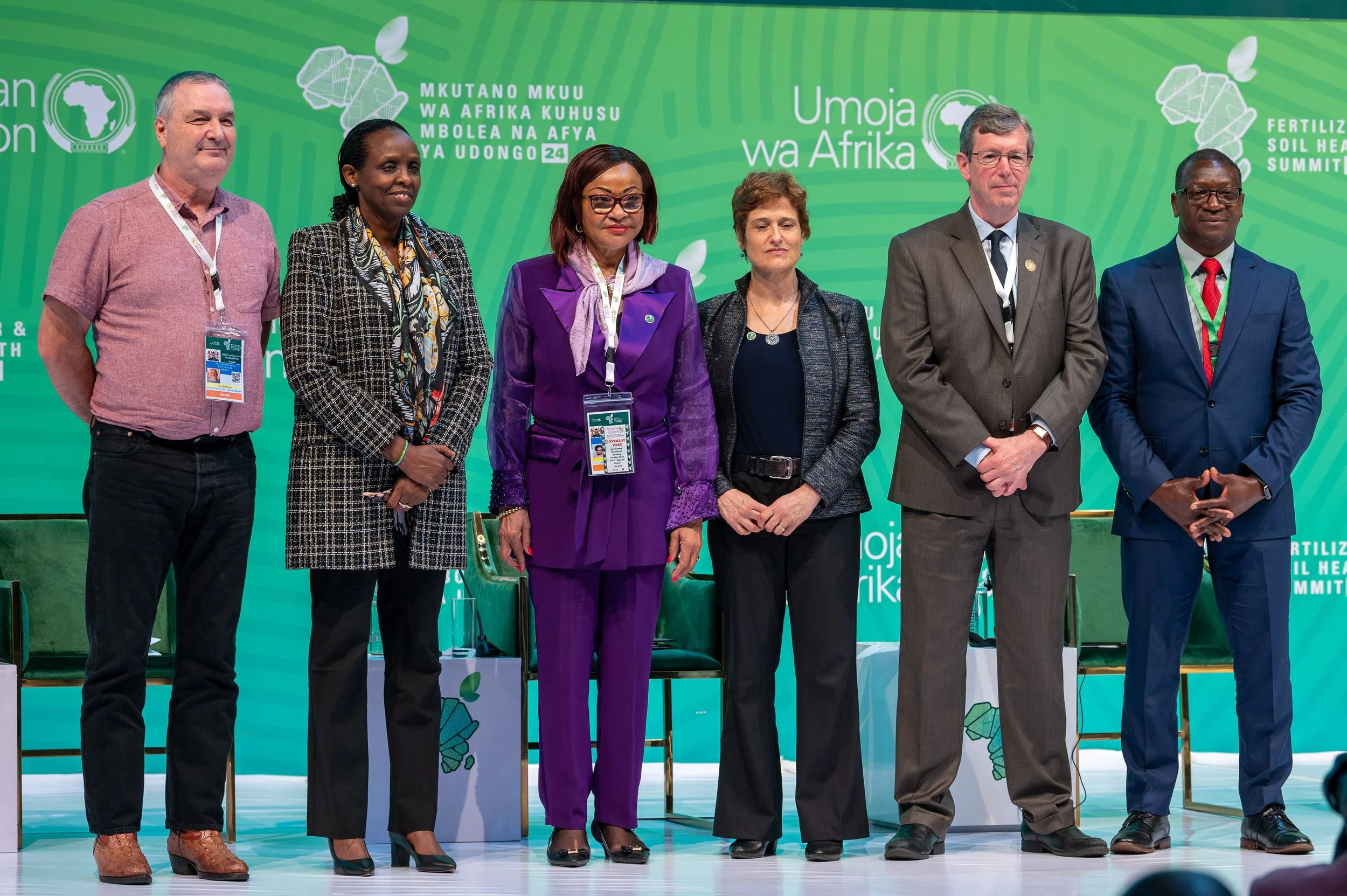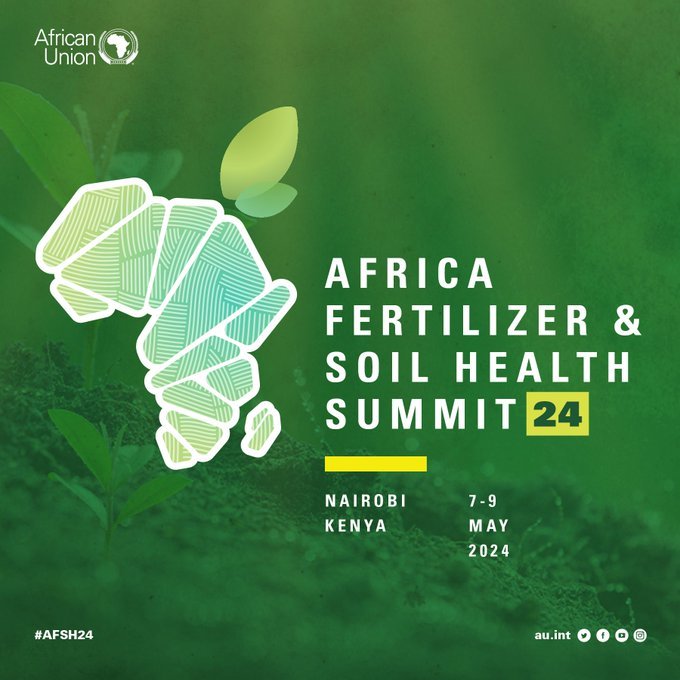Draft Nairobi Declaration on Africa Fertilizer and Soil Health Summit. Nairobi, Kenya | 9 th May 2024
We, the Heads of State and Government of the African Union have met in Nairobi, Kenya during the Africa Fertilizer and Soil health Summit;
Recalling that the 2006 Abuja Declaration on Fertilizer for the African Green Revolution identified the critical need to increase fertilizer use to stimulate agricultural productivity growth to end hunger and poverty in Africa;
Recalling the Comprehensive Africa Agriculture Development Program (CAADP) Malabo Declaration adopted during the Twenty-Third Ordinary Session of the AU Assembly in Malabo, Equatorial Guinea in June 2014. In the Declaration, the Member States committed to inclusive agricultural transformation. The CAADP-Malabo declaration also solidified previous decisions, including the 2003 Maputo Declaration on CAADP; the 2004 Sirte Declaration on the Challenges of Implementing Integrated and Sustainable Development in Agriculture and Water in Africa;
Acknowledging the persistent and long-term challenges in implementing commitments in the various declarations, and appreciating the progress made since the Abuja Declaration, especially the significant increase in local manufacturing of mineral fertilizers to over $15 billion of investments by the private sector;
Deeply concerned that since the adoption Abuja declaration in 2006, fertilizer consumption in Africa has only increased from an average of 8kg/ha to about 18kg/ha, which is less than half of the target of 50kg/ha set in the declaration;
Recalling that the average global fertilizer consumption rate is about 135kg/ha and that Africa’s average consumption rate of 18kg/ha is only 13 percent of the global rate;
Recognizing that while the Continent now produces approximately 30 million metric tons of mineral fertilizer each year, most of the fertilizers are exported outside the continent and the majority of Member States are still over-dependent on imported fertilizer, especially non-phosphate-based ones which expose Africa to external market shocks.
Further acknowledging that the recent global fertilizer crisis has disproportionately affected Africa, with a year-on-year decline of 25% in fertilizer consumption in 2022.
Recognizing that focusing on fertilizers alone cannot stop land degradation nor boost the productivity of Africa’s soils and their agricultural yields.
Concerned about the continued reliance on cropland expansion to increase agricultural production, the continued slow pace of agricultural productivity increase, the small area under sustainable soil management and the resultant soil nutrient depletion, low farmer incomes, expansive land degradation, CO2 emissions, severe biodiversity loss, and high environmental cost. This decline in soil health significantly reduces the response of crops to the use of yield-enhancing inputs such as mineral fertilizers and improved crop varieties, and greatly increases the vulnerability of smallholder farmers and communities to the impacts of climate and other shocks.
Further acknowledging that the perspective on agricultural sustainability has evolved from a narrow crop productivity and profitability focus to a broader focus on social, environmental, and economic sustainability, climate change mitigation, rehabilitation of degraded land, and restoration and maintenance of environmental services, including biodiversity.
Appreciating that the need to increase fertilizer use in Africa remains valid andpertinent, and this must be done in a way that supports soil health and environmental resilience. Africa’s agriculture also continues to be highly susceptible to climate change which threatens the future sustainability of agriculture on the continent.
Reflecting that today the challenges of food insecurity, malnutrition, and climate change persist and require urgent attention. The need for regional cooperation on the issue of fertilizer and soil health is greater than ever before as opportunities for investment and great inter- and intra-regional trade are now significantly enhanced by AU member states’ adoption of the Africa Continental Free Trade Area (AfCFTA).
Appreciative of the fact that increasing the use of fertilizer, both mineral and organic resources, is an imperative for increasing productivity and soil health restoration. The efficiency and effectiveness of mineral and organic fertilizers and other complementary inputs must be enhanced to increase productivity, maximize profitability and returns on investment, improve soil health, and enhance resilience to climate change.
Mindful of the imperative that building soil health and regenerating degraded soils is critical for sustainable food systems transformation and is a prerequisite for efficient and effective use of fertilizers and that it is a long-term process. Supporting mechanisms and incentives are necessary to enable farmer investments in soil health improvement.
Stressing that investments in local domestic manufacturing and blending of fertilizers must be leveraged to capitalize on the continent’s resources and reduce reliance on global markets. Fertilizer access and affordability must be improved. Financing tools such as trade credit guarantees, working capital, and targeted subsidies must be consolidated to reduce market distortions, reduce costs and strengthen input supply chains.
Recognizing the opportunities offered by regional cooperation, coordination, and harmonization of fertilizer policies and regulations, pooling investments to increase the capacity of countries and the continent to produce fertilizers, coupled with easing cross-border trade; collaborative research and development, capacity building as well as cross-country learning and sharing of best practices.
Further recognizing the integrated nature of Africa’s agricultural sub-sectors (crops, fisheries, forests, and livestock) and soil health concerns which require the prioritization of integrated soil and water conservation and management at the watershed, landscape, or catchment level to improve soil health.
Further recognizing that the last-mile delivery system in Africa is weak, with long distances for farmers to access fertilizer and other critical agricultural inputs as well as advisory services.
Hereby:
Endorse the Fertilizer and Soil Health Action Plan and the Soil Initiative for Africa Framework as key guiding documents to harness multi-stakeholder partnerships and investments to drive policies, finance, research and development, markets, and capacity building for fertilizer and sustainable soil health management in Africa.
On Fertilizer:
1. We commit to triple domestic production and distribution of organic and inorganic fertilizers by 2033 to improve access and affordability for smallholder farmers through the following actions:
a. Boost local production and blending of mineral fertilizers using locally available raw materials.
b. Strengthen research and development on the utilization of inorganic and organic fertilizers by resuscitating the African Centre for Fertilizer Development in Harare
c. Provide incentives for local production, utilization and recycling of organic resources.
d. Leverage opportunities offered by decentralized, low-carbon, and circular fertilizer production.
e. Establish small and medium (SME) ventures, especially by youth and women, oriented to the production and distribution of organic and inorganic fertilizers.
f. Leverage the African Continental Free Trade Agreement (AfCFTA) to double intra-Africa fertilizer trade by 2033.
2. We commit to make available by 2033, to at least 70% of smallholder farmers on the continent, targeted agronomic recommendations for specific crops, soils, and climatic conditions to ensure greater efficiency and sustainable use of fertilizers through the following actions:
a. Develop context-specific fertilizer and soil health advisory recommendations leveraging the potential of data and following principles of 4R Nutrient Stewardship and Integrated Soil Fertility Management.
b. Develop and deploy standardized and appropriate tools for assessing soil fertility, soil health, and context-specific sustainable soil management and nutrient requirements.
c. Establish a digital information and database operational at continental, regional, and national levels.
d. Establish and operationalize a fertilizer, crop, and climate dashboard for decision support on soil management.
On Soil Health:
3. We commit to reverse land degradation and restore soil health on at least 30% of degraded soil by 2033 through the following actions:
a. Deploy innovative incentive mechanisms - including repurposing current subsidy programs - to encourage soil health investments by smallholder farmers.
b. Promote integrated soil and water conservation, planning, and management practices across agricultural sub-sectors and landscapes/ watersheds.
c. Promote investments in irrigation as part of integrated soil and water resource management for enhancing nutrient-use efficiency and climate change resilience.
d. Strengthen national research and extension systems to tackle soil health challenges and improve the quality of support to smallholder farmers.
e. Promote organic agriculture practices to improve soil health alongside conventional agriculture.
On Financing
4. We commit to fully operationalize the Africa Fertilizer Financing Mechanism (AFFM) to improve production, procurement, and distribution of organic and inorganic fertilizers, and soil health interventions through the following actions:
a. Widening the scope of the Mechanism to support the implementation of this declaration with specific attention to de-risking farmer investments in yield-enhancing technologies and soil health of current and targeted food security crops; financing infrastructure and logistics to improve availability of organic and inorganic fertilizers, access to food markets for farmers and; supporting fertilizer and soil health policy reforms.
b. Create a multi-source soil health fund, for research, innovation, capacity building, and start-ups on fertilizer use and soil health actions. The fund to be part of the already existing Africa Fertilizer Financing Mechanism (AFFM), which is hosted by the African Development Bank (AfDB).
On Creating an Enabling Environment
5. We commit to formulating and implementing policies and regulations to create a conducive environment for fertilizer and soil health interventions through the following actions:
a. Develop continent-wide, context-specific guidelines for the formulation and implementation of relevant and effective fertilizer and soil health policies;
b. Harmonize national and regional policies and regulatory frameworks to ensure coherence and promote regional and continental trade.
On Capacity Enhancement to Support Implementation
6. We commit to developing and promoting systemic national capacity building for locally relevant fertilizer and soil health management practices and technologies through the following actions:
a. Establish regional research and development networks for the exchange of knowledge and technologies;
b. Work with partners to establish and convene a biennial Continental Fertilizer and Soil Health Summit;
c. Build, strengthen, and standardize the fertilizer analysis capacity and services of laboratories in accordance with fertilizer quality standards.
d. Capacitate the Africa Centre for Fertilizer Development that was set up in Harare by the AUC
7. We commit to ensuring that at least 70% of smallholder farmers have access to quality extension and advisory services on fertilizer and soil health both from public and private extension systems through the following actions:
a. Review and upgrade tertiary training programmes for soil science and agronomy to include subjects relevant to sustainable soil management;
b. Build, strengthen, and standardize the soil analytical services to ensure they are available and affordable to smallholder farmers;
c. Strengthen last-mile delivery systems by supporting agro-dealers and SMEs.
Call for Action
We request:
1. AUC and AUDA-NEPAD to support Member States in domesticating promising mechanisms for rewarding smallholder farmers for improved soil health practices, including carbon markets;
2. AUC and AUDA-NEPAD to develop a systematic soil health monitoring system aligned with existing CAADP M&E systems, in order to track progress, including developing continent-wide metrics for measuring soil health;
3. AUC and AUDA-NEPAD to develop a post-summit implementation roadmap for the Fertilizer and Soil Health Action Plan and in line with the Soil Initiative for Africa, and report to the Specialized Technical Committee (STC) on Agriculture, Rural Development, Water and Environment in November 2025;
4. AUC and AUDA/NEPAD to develop the partnerships and institutional arrangements for implementation of this declaration.
5. AUC and AUDA-NEPAD to support and retool the African Centre for Fertilizer Development as an institution to support research and development of fertilizers in Africa.
We call upon:
6. The private sector to increase investments in Africa’s fertilizer industry and promote sustainable soil management practices;
7. Continental and International Financial Institutions to support private and public sector investments in Africa’s fertilizer industry;
8. Development partners to support governments and regional economic communities to adopt best practices in fertilizer use and soil management.
Done in Nairobi, Kenya, on 9th May 2024


